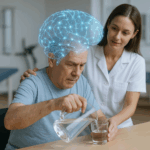
Regaining Strength and Mobility:
The Essential Role of Physiotherapy After Orthopedic Surgery
Orthopedic surgery is a significant intervention aimed at restoring function and mobility for individuals with musculoskeletal conditions such as fractures, joint injuries, or degenerative diseases. While surgery addresses the underlying structural issues, the journey towards full recovery requires comprehensive rehabilitation, with physiotherapy playing a crucial role. In this guide, we’ll delve into the essential role of physiotherapy in regaining strength and mobility after orthopedic surgery, exploring the key principles, interventions, and benefits of post-operative rehabilitation.
Preoperative Preparation and Education:
Before undergoing orthopedic surgery, patients benefit from preoperative preparation and education provided by physiotherapists. Preoperative physiotherapy aims to optimize patients’ physical condition, mobility, and functional status to enhance surgical outcomes and facilitate post-operative recovery. Physiotherapists educate patients about the surgical procedure, expected outcomes, rehabilitation process, and post-operative precautions. They may also prescribe prehabilitation exercises to improve muscle strength, joint mobility, and cardiovascular fitness, preparing patients for the challenges of surgery and rehabilitation.
Early Mobilization and Pain Management:
Following orthopedic surgery, early mobilization and pain management are essential components of post-operative care. Physiotherapists work closely with patients to initiate gentle movements, weight-bearing activities, and range of motion exercises as soon as medically appropriate. Early mobilization helps prevent complications such as stiffness, joint contractures, and muscle weakness, promoting circulation, tissue healing, and functional recovery. Physiotherapists also implement pain management strategies, including manual techniques, modalities, and therapeutic exercises, to alleviate post-operative discomfort and facilitate rehabilitation progress.
Muscle Strengthening and Conditioning:
Muscle weakness and deconditioning are common consequences of orthopedic surgery, leading to functional limitations and decreased mobility. Physiotherapy focuses on rebuilding muscle strength, endurance, and power through targeted strengthening exercises and conditioning programs. Progressive resistance training, functional exercises, and neuromuscular re-education techniques are employed to improve muscle recruitment, coordination, and proprioception. By addressing muscle imbalances and weakness, physiotherapists help restore functional capacity and enhance overall mobility and independence.
Range of Motion and Joint Mobility:
Preserving or restoring joint mobility and range of motion is a primary goal of post-operative physiotherapy. Physiotherapists employ a variety of techniques, including passive and active range of motion exercises, joint mobilizations, and stretching protocols, to improve joint mobility, flexibility, and tissue extensibility. These interventions help prevent joint stiffness, adhesions, and contractures, promoting optimal functional recovery and facilitating the return to activities of daily living. Patient education on home exercise programs and self-management strategies also enhances compliance and long-term outcomes.
Gait Training and Functional Rehabilitation:
Gait abnormalities and impaired functional mobility are common challenges following orthopedic surgery, particularly in weight-bearing joints such as the hip, knee, or ankle. Physiotherapists conduct comprehensive gait assessments and functional evaluations to identify impairments and develop targeted rehabilitation plans. Gait training exercises, balance drills, and functional movement patterns are incorporated to improve walking mechanics, symmetry, and efficiency. By addressing gait deviations and functional limitations, physiotherapists help patients regain confidence, independence, and mobility in their daily activities.
Pain Management and Symptom Control:
Orthopedic surgery often results in post-operative pain, swelling, and discomfort, which can hinder rehabilitation progress and affect patients’ quality of life. Physiotherapists employ various pain management techniques, including manual therapy, modalities, and therapeutic exercises, to alleviate pain, reduce inflammation, and promote tissue healing. Patient education on pain coping strategies, activity modification, and ergonomic principles empowers individuals to manage their symptoms effectively and participate fully in rehabilitation activities. By addressing pain and symptom control, physiotherapists optimize patient comfort and engagement in the recovery process.
Patient Education and Self-Management:
Patient education is a cornerstone of post-operative physiotherapy, empowering individuals to take an active role in their recovery and long-term health. Physiotherapists educate patients about the importance of adherence to rehabilitation protocols, home exercise programs, and lifestyle modifications. They provide guidance on proper body mechanics, joint protection techniques, and strategies for preventing future injuries. By promoting self-management skills and fostering patient autonomy, physiotherapists equip individuals with the knowledge and resources needed to maintain optimal function, mobility, and well-being beyond the rehabilitation period.
In conclusion, physiotherapy plays an essential role in regaining strength and mobility after orthopedic surgery, facilitating optimal recovery and functional outcomes. Through preoperative preparation, early mobilization, muscle strengthening, range of motion exercises, gait training, pain management, and patient education, physiotherapists address the diverse needs of post-operative patients and empower them to achieve their rehabilitation goals. By providing comprehensive care, personalized interventions, and ongoing support, physiotherapy enhances patients’ quality of life, independence, and long-term musculoskeletal health.





